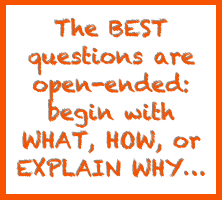 What is your “short” answer if someone asks why you don’t give your kids (or yourself) vaccines?
What is your “short” answer if someone asks why you don’t give your kids (or yourself) vaccines?
That is a great question I was recently asked on a Facebook Vaccine Discussion Group. I had so many thoughts, I couldn’t just give a short answer! I decided I need to devote a whole blog to it!
 Firstly, it is generally accepted and understood that the person asking the questions holds the power in any conversation. Being aware of this, it would be a good idea to be pre-armed with a few questions of your own!
Firstly, it is generally accepted and understood that the person asking the questions holds the power in any conversation. Being aware of this, it would be a good idea to be pre-armed with a few questions of your own!
So, pick a short answer of your choice, then follow it up with a relevant question. Both the answer and the question should be tailored to your particular audience and the situation.
If you are asked in a one on one conversation it can be quite different from being asked in the midst of a large group. Some groups and audiences are antagonistic, so keep in mind the most appropriate way to respond might need some THINKING IN ADVANCE!
There are many assumptions made by those who are asking the question — some they make about you personally, and some they make about the whole vaccine debate. Since you probably aren’t fully aware of ALL the assumptions they are making, asking them questions will help you (and them) to clarify their thinking on the subject, allowing you to be more specific in further points you may want to bring up.
It is important in this discussion for you not to become defensive or irritated. This is also very difficult — especially when you have spent sooooo many hours of research and feel sooooo passionately! It helps me to try to visualize a 5-year-old learning a new subject. They can’t help that they are ignorant, they may have limited ability to master the subject because of a basic lack of maturity and experience, but with patience, kindness, and respect they might be able to make some progress!
It is also important to consider the level of the relationship you have with this person, their role and influence in your life, and the future role they may have in your child’s life. While we can show respect to these people, that does not mean we need to bend to their wishes — no matter what type of pressure they may try to put on us!
With many of these things in mind, here are some of my basic short answers:
- I don’t accept vaccinations because I respect our natural immune system designed by my Creator more than any human efforts to bypass the immune system devised by individuals and companies for financial gain.
- I don’t vaccinate because I believe the benefits of vaccines have been completely misrepresented and a close look at history shows vaccines did not have the positive impact many believe.
- I don’t vaccinate because I feel the risks of any of the diseases for which they want to give me a toxic chemical cocktail injection, when treated naturally, are not nearly as much of a risk as the vaccine.
- I don’t vaccinate because I believe the best gift I can give anyone that I come into contact with (including the immuno-compromised) is a robust naturally developed immune system — which also keeps me and my children healthy.
- I don’t vaccinate because my research has helped me understand that vaccines have probably played a massive role in the exploding epidemics of auto-immune illness, arthritis, developmental delay, ASD, ADHD, ADD, juvenile diabetes, Crohn’s Disease, MS, cancer, ALS, etc. I’d rather fight the original illness than deal with a lifelong chronic debilitating illness.
- I don’t vaccinate because I believe the entire foundation of the early virologists lacked an understanding of the complexity of the natural immune system which exists predominantly in the gut. The gut is critical to health and is designed to handle foreign invaders, but injections bypass this well-organized system. Quantum levels of information has been discovered in the last 10 years about the gut and the immune system — far more than was known at the time vaccines were developed.
- I don’t vaccinate because most cases of the disease are actually occurring among the vaccinated, so the vaccines aren’t even protecting those who get them from the illness they are hoping to avoid.
- I don’t vaccinate because vaccines can interfere with bodily function far beyond the generally accepted medical explanation. Vaccine reactions are not always readily apparent, but injecting small babies with such toxic ingredients ALWAYS causes a negative impact on the body and it is not worth the risk for me.
- I don’t vaccinate because I know of real life tragedies of parents who thought they were doing the BEST thing for their baby and their baby died within 2 days of receiving the 2 month recommended vaccines.
 I don’t vaccinate because I know of FAR TOO MANY real life stories of families dealing EVERY SINGLE day with horrific vaccine injuries that cause debilitating brain damage (aka autism) to their child. It is not a risk I want to take.
I don’t vaccinate because I know of FAR TOO MANY real life stories of families dealing EVERY SINGLE day with horrific vaccine injuries that cause debilitating brain damage (aka autism) to their child. It is not a risk I want to take.- If I am feeling particularly snarky, I would look at my beautiful precious baby and say, I don’t vaccinate, because why would I want to inject this precious beautiful treasure full of toxic chemicals? It’s just not common sense.
Some questions which should follow your short preferred statement:
- What do you know about the ingredients in vaccines?
- What is the impact on a baby’s body of all the combined injections at one time (no one knows the answer to this — except those parents who have carefully observed and documented it, because there have been no scientific studies on the combined recommended vaccines)?
- Which disease worries you most, and why?
- What do you know about chronic, debilitating auto-immune disorders?
- What role does nutrition play in infectious diseases like measles? (Vitamin A pretty much mitigates measles deaths and measles deaths are greatly exaggerated.)
- What do you think is the reason behind giving Hepatitis B to infants when it is generally accepted that only IV drug users and prostitutes are at risk for this illness?
- What do you know about the payouts made for vaccine damage since the National Vaccine Injury Compensation Program was started in 1988?
 Notice that most of the questions begin with what. Try to think of questions that require more of an answer than yes or no.
Notice that most of the questions begin with what. Try to think of questions that require more of an answer than yes or no.
Again, allow them to THINK. That, in a nutshell, is really the purpose of your answer/question combination. Say something brief, thoughtful and respectful, then ask a probing question. Allow them to think. Don’t think that you will change their mind in one encounter. In most cases, they have been indoctrinated their whole life to believe that vaccines are good!
If your conversation is with a medical person, realize that the entire foundation of their life and livelihood is dependent on them maintaining their good opinion of vaccines. However, by your respectful question it COULD be a beginning to an awakening!
If you are new to the subject and feel absolutely convinced in your heart that vaccines are not good for you or your children, yet feel fearful of the opinion of others — especially of those in your life who are highly educated — don’t think you need to even try to convince them. Make your point respectfully, and if they keep badgering you, take the high road and respectfully say you hear what they say, but you are convinced and you would rather they stop trying to impose their thoughts or opinions on you. You are happy with your choice and if you want to continue the relationship, they need to respect your choice.
I also suggest a polite decline to all medical personnel rather than a detailed explanation of exactly what you have learned about vaccines. They are not likely to learn anything from you, and by engaging in a conversation with them, you are opening yourself up to the pressure they have been trained to put on you.
Rather keep it short, “No thanks, we won’t be getting shots today,” like a broken record, repeated every time they offer a vaccine or another reason you should accept one.
This is not a complete, exhaustive list, but I hope it gives you some confidence in communicating WHY you don’t vaccinate – AND I also hope you feel empowered to help someone else begin to explore this EXTREMELY VITAL topic.
I seriously believe this is the number one issue parents today face. If you want your child to be healthy for their entire life, educating and navigating the vaccine debate is the most important thing you can do. I want the truth to be told so that we can have more healthy children. We can do it together, one piece of information at a time.
I’d love to know your ideas of what to say, or other questions to ask. Please add your thoughts to the comments below!
30 ways in 30 Days, Exploring Vaccines: Day 29
- Day 28: A Mother’s Anguish
- Day 27: NO ADVICE Please
- Day 26: Essential Questions
- Day 25: Truth Warriors
- Day 24: Healthy Toddlers DON’T JUST DEVELOP AUTISM
- Day 23: Navigating the Information
- Day 22: How Many More Must Die?
- Day 21: Where are the WARNINGS?
- Day 20: What about School?
- Day 19: Can babies die from a vaccine?
- Day 18: What do I say to my doctor?
- Day 17: Healthy Babies Don’t Just Die part 2
- Day 16: Sincere, but Sincerely WRONG
- Day 15: Thinking About Babies?
- Day 14: Is our Hope in Congress?
- Day 13: Worse than death?
- Day 12: Healthy Babies Don’t Just Die
- Day 11: Flu Shots in Pregnancy?
- Day 10: In a Nutshell
- Day 9: Tetanus Links
- Day 8: Number of Vaccines
- Day 7: Calling All Christians
- Day 6: Choosing Wisely
- Day 5: Our Microbiome
- Day 4: Voices of Reason
- Day 3: It’s not just Autism
- Day 2: Can good people confidently give bad advice?
- Day 1: Who do you trust?
